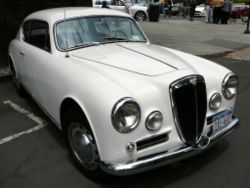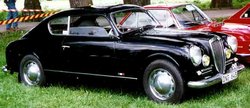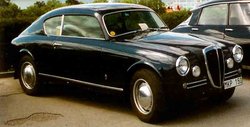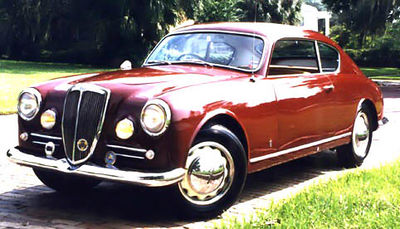Difference between revisions of "Lancia Aurelia"
m (→5th series) |
m (→3rd series) |
||
| Line 35: | Line 35: | ||
The second series Aurelia coupe pushed power up to {{Auto hp|80|0}} from the 1991 cc V6 with a higher [[compression ratio]] and repositioned valves. Other changes included better brakes and minor styling tweaks, such as chromed bumpers instead of the aluminium ones used in the earlier car. . A new dashboard featured two larger instrument gauges. The suspension was unchanged from the first series. A new '''B22''' sedan was released in 1952 with dual [[Weber carburetor|Webers]] and a hotter camshaft for {{Auto hp|90|0}}. | The second series Aurelia coupe pushed power up to {{Auto hp|80|0}} from the 1991 cc V6 with a higher [[compression ratio]] and repositioned valves. Other changes included better brakes and minor styling tweaks, such as chromed bumpers instead of the aluminium ones used in the earlier car. . A new dashboard featured two larger instrument gauges. The suspension was unchanged from the first series. A new '''B22''' sedan was released in 1952 with dual [[Weber carburetor|Webers]] and a hotter camshaft for {{Auto hp|90|0}}. | ||
| − | == | + | ==Third series== |
The 3rd series appeared in [[1953]] with a larger 2451 cc version of the engine. The rear of the car lost the tail fins of the earlier series, but was well resolved in an elegant and definitive look for the Aurelia coupe. | The 3rd series appeared in [[1953]] with a larger 2451 cc version of the engine. The rear of the car lost the tail fins of the earlier series, but was well resolved in an elegant and definitive look for the Aurelia coupe. | ||
Revision as of 20:10, 2 October 2007

| |
| Lancia Aurelia | |
|---|---|
| Production: | 1950-1958 |
| Successor: | Lancia Flaminia |
| Manufacturer: | Lancia |
| Class: | Grand tourer |
| Body Style: | 2-door convertible 2-door coupé 4-door sedan |
| Designer: | Vittorio Jano |
| engine: | 1.8 L 1800 V6 2.0 L 2000 V6 2.5 L 2500 V6 |
The Lancia Aurelia is considered by many to be the first true Grand Turismo automobile. Designed by Vittorio Jano, the Aurelia was launched in 1950 and production lasted through the summer of 1958.
The Aurelia used the first production V6 engine, a 60° Jano design which grew from 1.8 L to 2.5 L. It was an all-alloy pushrod design with a single camshaft between the cylinder banks. A hemispherical combustion chamber and inline valves were used. A single Weber 40 carburetor completed the engine.
At the rear was an innovative combination transaxle with the gearbox, clutch, differential, and inboard-mounted drum brakes. Front suspension was a sliding pillar design, with rear semi-trailing arms replaced by a de Dion tube in the 4th series.
First series
The very first Aurelias were the B10 berlinas (sedans). They used a 1754 cc version of the V6 which produced 56 hp (42 kW). The B21 was released in 1951 with a larger 1991 cc 70 hp (52 kW) engine. A 2-door B20 GT coupé appeared that same year. It had a shorter wheelbase and a Ghia-designed, Pininfarina-built body. The same 1991 cc engine produced 75 hp (56 kW) in the B20. In all, 500 first series Aurelias were produced.
Second series
The second series Aurelia coupe pushed power up to 80 hp (60 kW) from the 1991 cc V6 with a higher compression ratio and repositioned valves. Other changes included better brakes and minor styling tweaks, such as chromed bumpers instead of the aluminium ones used in the earlier car. . A new dashboard featured two larger instrument gauges. The suspension was unchanged from the first series. A new B22 sedan was released in 1952 with dual Webers and a hotter camshaft for 90 hp (67 kW).
Third series
The 3rd series appeared in 1953 with a larger 2451 cc version of the engine. The rear of the car lost the tail fins of the earlier series, but was well resolved in an elegant and definitive look for the Aurelia coupe.
Fourth series
The fourth series introduced the new de Dion tube rear suspension. The engine was changed from white metal bearings to shell bearings. An open car, the B24 Spider was introduced at this time (1954 to 1955) and was well received. It was similar to the B20 coupé mechanically, with an 8 inch (203 mm) shorter wheelbase than the coupé.
The fourth series cars were the first Aurelias to be available in left-hand drive; fourth series Aurelias were the first ones to be imported to the US in any number.
This model was immortalized by Dino Risi's 1962 movie Il Sorpasso (The Easy Life), starring Vittorio Gassman. The actual car used for shooting (a single model) was destroyed during the accident scene sealing the end of the story.
Fifth series
The 5th series coupes, appearing in 1956, was more luxury-oriented. It had a different transaxle (split case), which was more robust and similar to that used in the later Flaminias. The dirve shaft was also revised to reduce vibration.
Along side the fifth series coupes was a revised open car, the B24 Convertible. This differed from the earlier (4th series) B24 Spider, having roll up windows and better seating position, a windscreen with vent windows. In mechanical aspects, the B24 convertible was similar to the coupe of the same series.
Sixth series
Power was down to 112 hp (84 kW) for the 1957 sixth series, with increased torque to offset the greater weight of the later car. The sixth series coupés had vent windows, and typically a chrome strip down the hood. They were the most touring oriented of the B20's.
The sixth series B24 convertible was very similar to the fifth series, with some minor differences in trim. Most notably, the fuel tank was in the trunk, not behind the seats as it was in the fourth and fifth series open cars. This change, however, did not apply for the first 150 sixth series cars, which were like the fifth series. The sixth series convertibles also featured different seats than either both earlier cars.
| Lancia S.p.A.
|
||
|
037 / Rally | Appia | Aprilia | Ardea | Artena | Astura | Augusta (1932-1937) | Aurelia | Beta | Dedra | Delta (1979-1994) | Dilamda (1928-1938) | Fulvia Dunja (1971) | Flaminia | Flavia | Fulvia (1963-1976) | Gamma | Hyena | Kappa | Lambda (1922-1931) | Lybra | Monte Carlo | Prisma (1982-1990) | Pagani (1947) | Phedra | Stratos | Thema | Thesis (2001-) | Y10 | Zagato | Zeta | Ypsilon | ||



